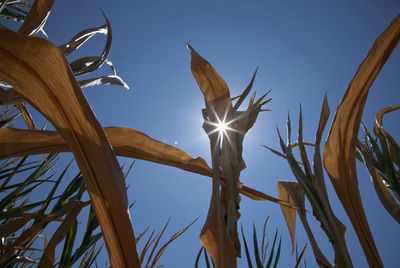Maybe it’s time to think about doing things differently, farmers.
You can’t tell by Minnesota weather, but there’s still a drought underway in the country, and that’s bad news for many of the nation’s farmers.
“We can’t take much more of this,” the Associated Press quotes farmers as saying in a story today.
“You always know that there’s going to be a year when you have a failed crop or some sort of disaster,” Walker says. “Normally you can manage one year, but when you go to two or three years, you’re left questioning your choice of occupation. It can set you back on your heels.”
Still, he remains an optimist. Though as much as 80 percent of his wheat may be damaged from the drought and freeze, he sees any losses as a temporary setback. “We won’t shut down,” says Walker, who farms with his father. “We will get through this one way or another.”
The merciless drought that ravaged large sections of the Midwest and Plains is over, disappearing this spring in a dramatic weather reversal: heavy rains and floods swamping fields with mud in many areas. But some farmers and ranchers in parts of the West and the Plains, including southwest Oklahoma, are pondering the prospect of another year of a desert-like landscape and a disappointing harvest.
But many farmers are going to have their losses covered by government-backed insurance even if things don’t go so well. And, Bloomberg News suggests, they’ll be right back next year doing the same thing, shielded, the story this week said, from “the full burden of their bad bets.”
Drought helped drive the cost of crop insurance to a record $17.2 billion last year, the U.S. Department of Agriculture reported. But there is little effort by authorities to persuade farmers to dial back on crops in an era when weather extremes are more apparent.
We have given farmers incentives to take on more risk rather than give them an incentive to create a permanent solution,” said Vincent Smith, a professor of agricultural economics at Montana State University in Bozeman. “You want to move toward programs that allow them to alleviate problems before the fact.”
USDA subsidies encouraging farmers to ignore addressing extreme weather are harder to justify, Smith and other analysts insist, when automatic budget cuts remove 5 percent from most U.S. programs and lawmakers prepare to craft a new five-year farm law.
(Photo: Associated Press)

